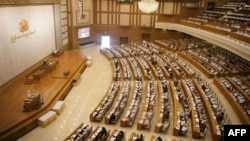A lawmaker in army uniform gave an impassioned speech before Myanmar's parliament, flaunting the might of the military with a picture slide-show of tanks, heavy weapons and statues of heroic soldiers.
Under debate are changes to a 2008 constitution that would weaken the powerful political stake the military awarded itself before its top brass ended their half-century rule in 2011 to usher in a new era of managed democracy.
"Myanmar is still in a democratic transition ... stability and reconciliation are very important in this period and democratic practices are not mature enough yet," Brigadier General Tin San Naing, one of 166 officers hand-picked by the military to serve as lawmakers, told the house as debate opened on Tuesday. "This is not the right time."
The military's political clout is one of the most divisive issues in the new quasi-civilian system, as Myanmar prepares for an election this year that could dictate the pace of reforms in a country that has shifted quickly from a basket case to a promising frontier market.
The constitution gives the military a quarter of unelected legislative seats, ostensibly a veto on major issues like constitutional reform. The odds of military lawmakers voting to weaken their own political power are slim to none.
Opposition lawmakers like Nobel laureate Aung San Suu Kyi fear the generals could hold democracy hostage. Opponents want to remove what they see as an enshrined constitutional safeguard for the military's political and economic interests.
But doing that would be "disrespectful" to those who wrote the blueprint for democracy, Tin San Naing said, in a speech that won applause from men in blue, green and khaki uniforms.
Being debated is a proposal to trim the share of house votes required to amend the constitution from over 75 percent to 70 percent, essentially removing the military's veto.
But there was little hope among lawmakers of that happening before the election, and no sign of soldiers supporting it.
"It's necessary to keep the Myanmar military in the legislative and administrative sectors, to protect and stand for the country in its time of need," said army delegate Tin Soe.
National League for Democracy (NLD) party members urged the house to change another clause which bars its ageing leader, Suu Kyi, idolized in Myanmar for her peaceful struggle against the former dictatorship, from running for president.
The clause stipulates anyone with a foreign spouse or children of foreign citizenship cannot become president. Suu Kyi's children are British, as was her late husband.
"If someone is respected and loved by the whole country, no limit should be placed on that person for the presidency," the NLD's Naing Ngan Lin told the house.
Another NLD lawmaker, Phyo Min Thein, said Suu Kyi's time to lead was running out.
"The government and military leaders are letting go of a very rare chance we only get once in a lifetime," he told Reuters.
NLD members expect to win most votes in the election. The party swept the last free ballot in 1990, but the junta ignored the result.
Suu Kyi, 70, reiterated concern on Tuesday that unrest could hinder voting, but didn't state any specific threat. Phyo Min Thein said the NLD stood to lose most from an interrupted vote.
"It's obvious most people in the country want the NLD to win," he said. "They know it would bring big changes to Myanmar."





